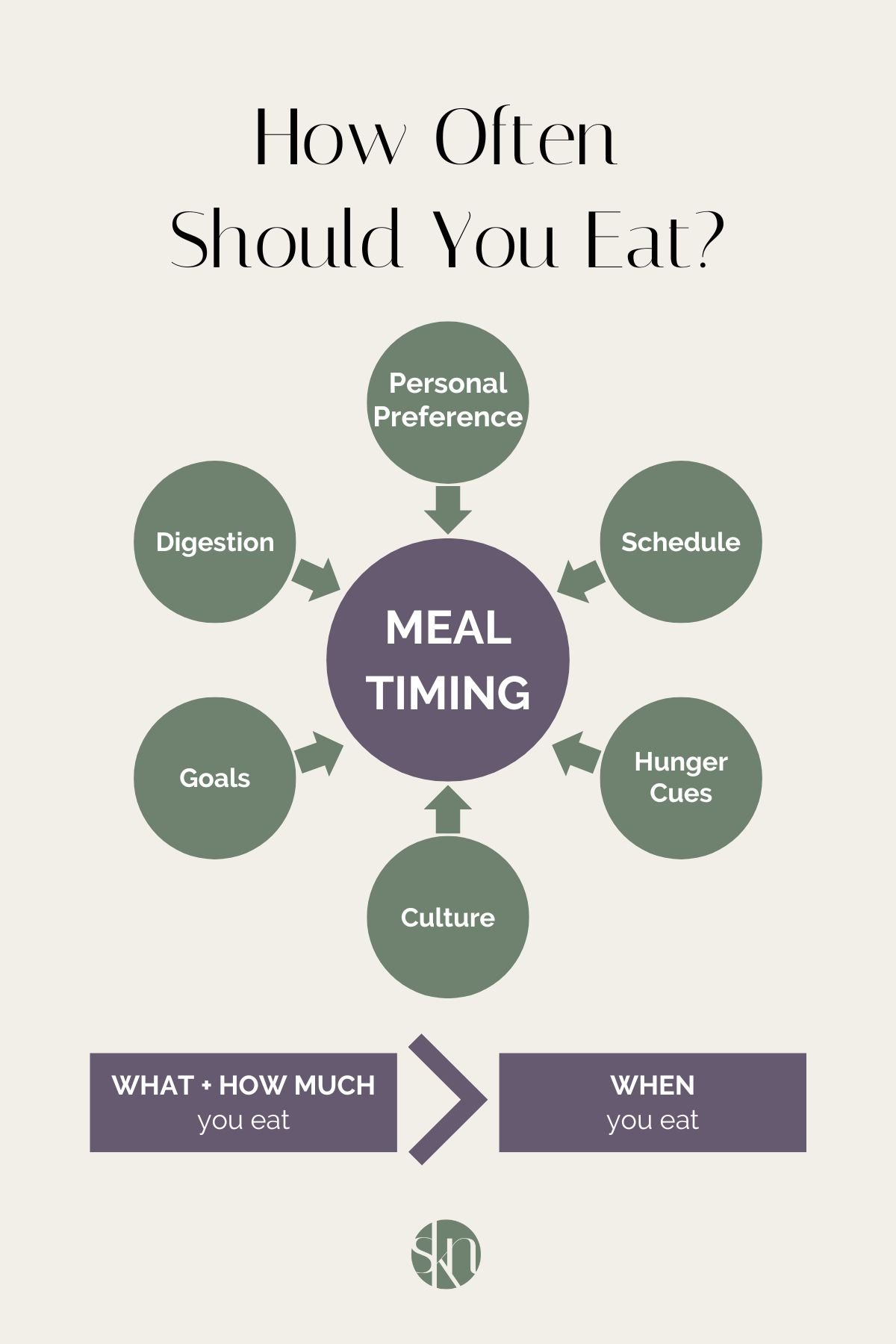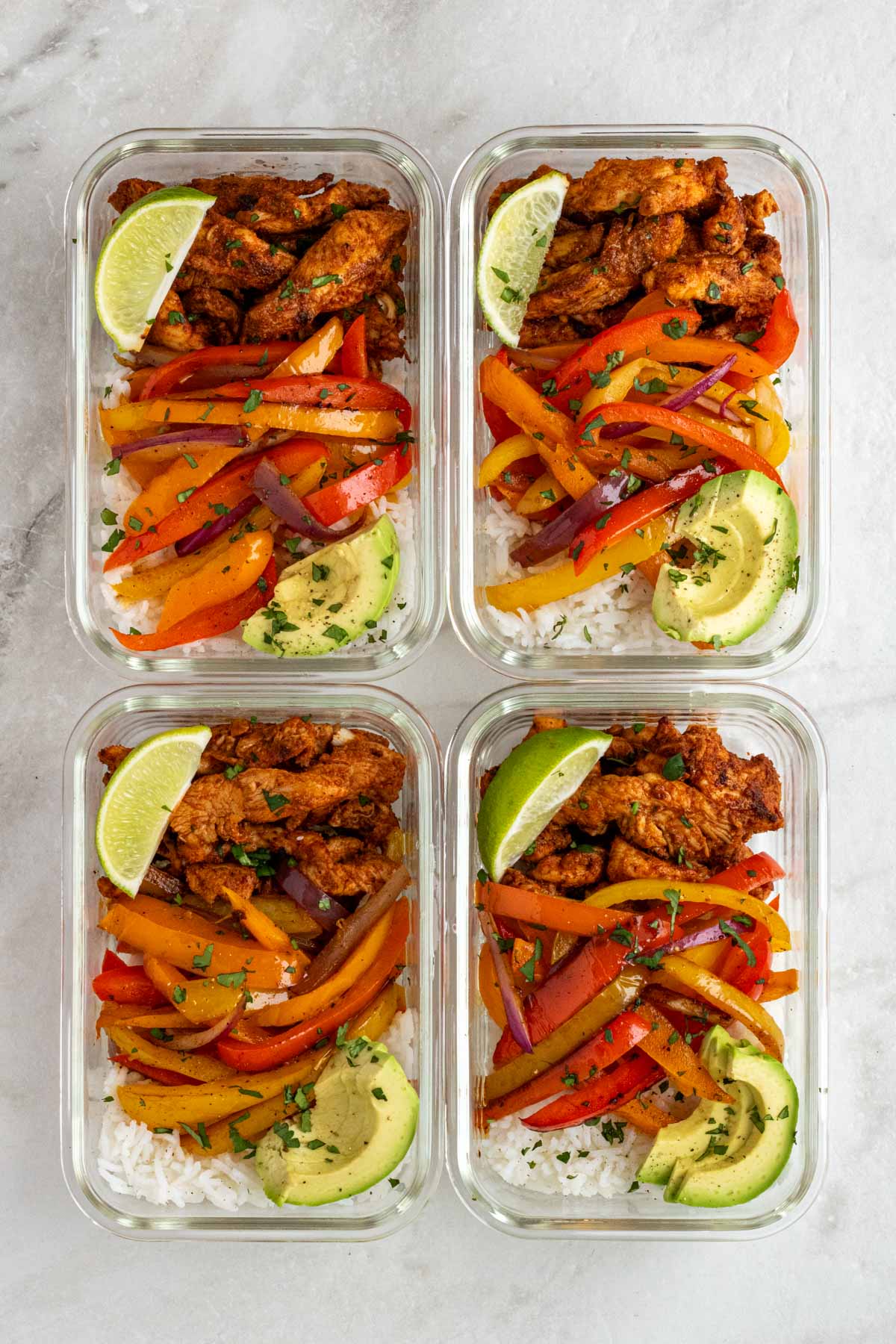Meal frequency is one of the most heavily debated topics in the nutrition industry. Some people advocate for eating 6 meals a day, while others advocate that intermittent fasting is the key to health, but where does the truth lie? Here is a breakdown of the pros and cons of meal timing for various goals and an answer to the age-old question: how often should you eat?

Table of contents
Meal Timing 101
The first rule of meal timing is that what and how much you eat is more important than when you eat.
While the timing of your meals can impact energy levels, blood sugar, and performance, consuming nutrient-rich whole foods has more health benefits than when you eat, and the number of calories you consume has a greater impact on weight and body composition than when you eat those calories (1).
One of the most commonly debated arguments for meal timing is that more frequent, smaller meals boost metabolism, while less frequent, larger meals slow metabolism. This theory is based on the idea that there is an increase in the thermic effect of foods (TEF) after eating, which provides a bump in metabolic rate.
Unfortunately, while TEF does contribute roughly 10% to the calories burned via digestion, it is directly proportional to the total calories consumed (2). For example, if a woman has a calorie target of 1,800 calories a day for weight loss, her meals and calories burned through TEF could break down as follows:
| # of Meals per Day | Calories per Meal | TEF per Meal | TEF per Day |
| 1 meal | 1,800 cals | 180 cals | 180 cals |
| 3 meals | 600 cals | 60 cals | 180 cals |
| 6 meals | 300 cals | 30 cals | 180 cals |
Overall, the total calories burned through TEF are the same regardless of meal frequency, which further reinforces the idea that what and how much you eat is more important than when you eat. The “best” meal timing and meal frequency strategy comes down to the individual, their lifestyle, and their goals.

Factors in Optimal Meal Frequency
If you’re wondering how often you should eat, here are some factors to consider:
1. Personal Preference
The biggest factor to consider when determining how often you should eat is personal preference. As the evidence shows, there is no single rule or best strategy when it comes to meal frequency, rather, it comes down to what works best for the individual. Whether you prefer to eat 3 times a day or 6 times a day, the best approach is the one you like and can adhere to.
2. Schedule
A person’s schedule also plays a big role in determining what meal frequency strategy to choose. People with busy schedules may find a couple of larger meals a more practical choice, while individuals with more flexible schedules may find smaller snack-size meals more appealing.
3. Hunger Cues
While eating when you’re hungry and stopping when you’re full may seem like the obvious approach to meal frequency, it’s not always as simple as it may seem. Not only can lifestyles and schedules get in the way, but intuitive eating can be difficult for certain individuals, especially those who have spent years dieting.
For some eating fewer larger meals may help some with portion control and feelings of fullness, while for others simply cannot function without multiple meals and snacks throughout the day. Regardless of the approach, it is best to use the hunger and fullness scale to help get in tune with your body’s natural cues to ensure you’re eating in a way that honors it.
4. Digestion
Digestive symptoms also play a role in determining how often you should eat. If eating larger meals less frequently leaves you sluggish and fatigued, smaller meals more often may be a better approach. Moreover, in addition to the frequency of meals, the macronutrient balance of meals can worsen or improve blood sugar control, which can influence the hunger cues and the need for more or less meals throughout the day.
5. Goals
Your personal goals are very important to consider when determining how often you should eat. While meal frequency does not directly affect metabolism or fat loss, it can increase dietary adherence, making goals easier to achieve. Moreover, sport-specific goals, such as increased strength, improved speed, or improved physique, may require unique dietary strategies and meal timing.
6. Culture
Culture also plays a role in the pattern of meals throughout the day. Not only does our culture impact what we eat, but it impacts meal frequency and timing, as well as preparation methods, mealtime etiquette, and more. While some cultures are known to eat 3 times a day, “breakfast”, “lunch”, and “dinner”, other cultures are known for eating only once a day.
Meal Frequency for Weight Loss
Contrary to popular belief, the idea that eating smaller meals more frequently boosts metabolism to increase fat loss is a myth. While digestion does slightly increase metabolic rate, the frequency of your meals has little to no effect compared to the total calories consumed throughout the day.
Multiple studies have shown that eating many smaller meals or fewer larger meals, given an equal amount of daily calories, has no significant effect on weight loss (3, 4, 5). Rather, it is the creation of a calorie deficit and the net balance of calories at the end of the day, week, and month that supports weight loss, not when you eat those calories.
Furthermore, the concept of skipping breakfast to accomplish “fasted cardio” (i.e. cardio occurs when you exercise on an empty stomach) has long been claimed to enhance the fat loss process but is largely irrelevant for weight loss. While there may be greater fat oxidation (i.e. fat “burning”) during exercise done in a fasted state, this does not translate directly to body composition changes over time, given it is the net fat balance that matters at the end of the day (6, 7). This means that even if you burn fat during exercise, if you over-consume calories, your body will store the surplus of calories as body fat, resulting in a neutral or positive body fat balance.
For weight loss, calories are king, not when you eat them. Ultimately, whether you choose a time-restricted eating or flexible dieting approach or eat 3 or 6 meals a day, meal frequency has little to no effect on weight loss, as long as your calorie expenditure exceeds your calorie intake over time.
Meal Frequency for Muscle Building
Much like weight loss, meal frequency has long been touted as vital for muscle building; however, more recent research has shown that it’s less important than once believed.
The post-exercise “anabolic window”; a limited timeframe after training to optimize training-related muscular adaptations, was long said to be integral to muscle growth and development (8). The concept suggested that a specific amount of protein should be consumed within 30-60 minutes of exercise to optimize muscle building, which became a deeply ingrained mantra in the fitness industry.
However, decades of additional research and meta-analyses have found that the anabolic effect of a protein-rich meal is roughly 3 to 5 hours, potentially longer depending on the size of the meal (9, 10). While consuming protein after a workout may be helpful, muscle protein synthesis is largely supported by total protein intake throughout the day, not during a specific window of time.
The recommended protein intake for maximizing muscle growth is 0.7 to 1.0 grams of protein per pound of body weight per day, and including protein in pre-workout snacks and post-workout meals can help support muscle protein synthesis.
Is snacking ok?
Snacking can be incorporated into a balanced diet and can even help with weight loss and muscle building, however, it must be used strategically. While snacking can increase adherence for certain individuals, for others, it may lead to excessive consumption.
Therefore, it’s imperative that you consider your personal preferences and behaviors and truly pay attention to your hunger-fullness cues to determine if your desire to snack is for physical or emotional reasons. The exact timing and frequency of snacking comes down to personal preference. If your goal is weight loss, you can snack as little or as much as you desire, as long as you adhere to your caloric intake. If your goal is sports performance, snacking at strategic times (i.e. before a game or race) can improve outcomes.
Moreover, contrary to popular belief, snacking late at night won’t cause weight gain, unless it drives you to eat more.
Is it ok to skip meals?
Yes, it’s ok to skip meals, particularly if you’re not hungry. Your body’s natural hunger and fullness cues are the best indicators of when to eat and should, almost always, be prioritized ahead of dietary guidelines. Unless an individual goal is healthy weight gain, where they may need to occasionally eat when they are not hungry or to a point of discomfort, you should eat when you’re hungry, stop when you’re full, and repeat.
In fact, while it’s often said that breakfast is the most important meal, you don’t need to eat breakfast to be healthy or lose weight, the same way eating breakfast won’t make you healthy or cause weight loss. When you choose to eat and what meals you choose to eat should be determined by your personal preference, cues, and goals.
Furthermore, time-restricted eating (TRE), a more strategic form of meal skipping, is completely safe to implement and can be beneficial for some. Not only can it be used as a form of calorie restriction to support weight loss without counting calories, but it has been shown to have additional health benefits. TRE and other forms of intermittent fasting (IF) have been shown to cause improvements in insulin sensitivity compared to normal or baseline diets (11). That said, it’s important to note that it has no specific benefit for weight loss and weight-related outcomes when compared to traditional calorie restriction via other forms such as calorie or macro counting.
Overall, skipping meals to create periods of feasting and fasting can put you in a favorable state for fat loss, but they’re never going to negate calorie balance.
So, how often do you really need to eat?
Overall, the quality of the food you eat and your total caloric intake matter more than when you are consuming them. How many meals you should eat per day is influenced by personal preference and your goals.
If your goal is general health, you can break your meals up any way you desire as long as you’re prioritizing whole foods and balanced meals. If your goal is weight loss, as long as you remain in a calorie deficit, you can consume as many or as few meals per day as you like. If your goal is muscle building or weight gain, as long as you’re consuming adequate protein and are in a calorie surplus, you can use any meal frequency to achieve it.
If you’re confused as to the best approach to support your goals, it’s best to work with a registered dietitian to create a plan that works for you.

The Bottom Line
How often you should eat per day is based on personal preference, schedule, hunger cues, digestion, goals, and culture. Generally speaking, eating smaller or larger meals less frequently has no direct effect on health outcomes, weight loss, or body composition. What and how much an individual eats is more impactful than when they choose to eat.



Leave a Review